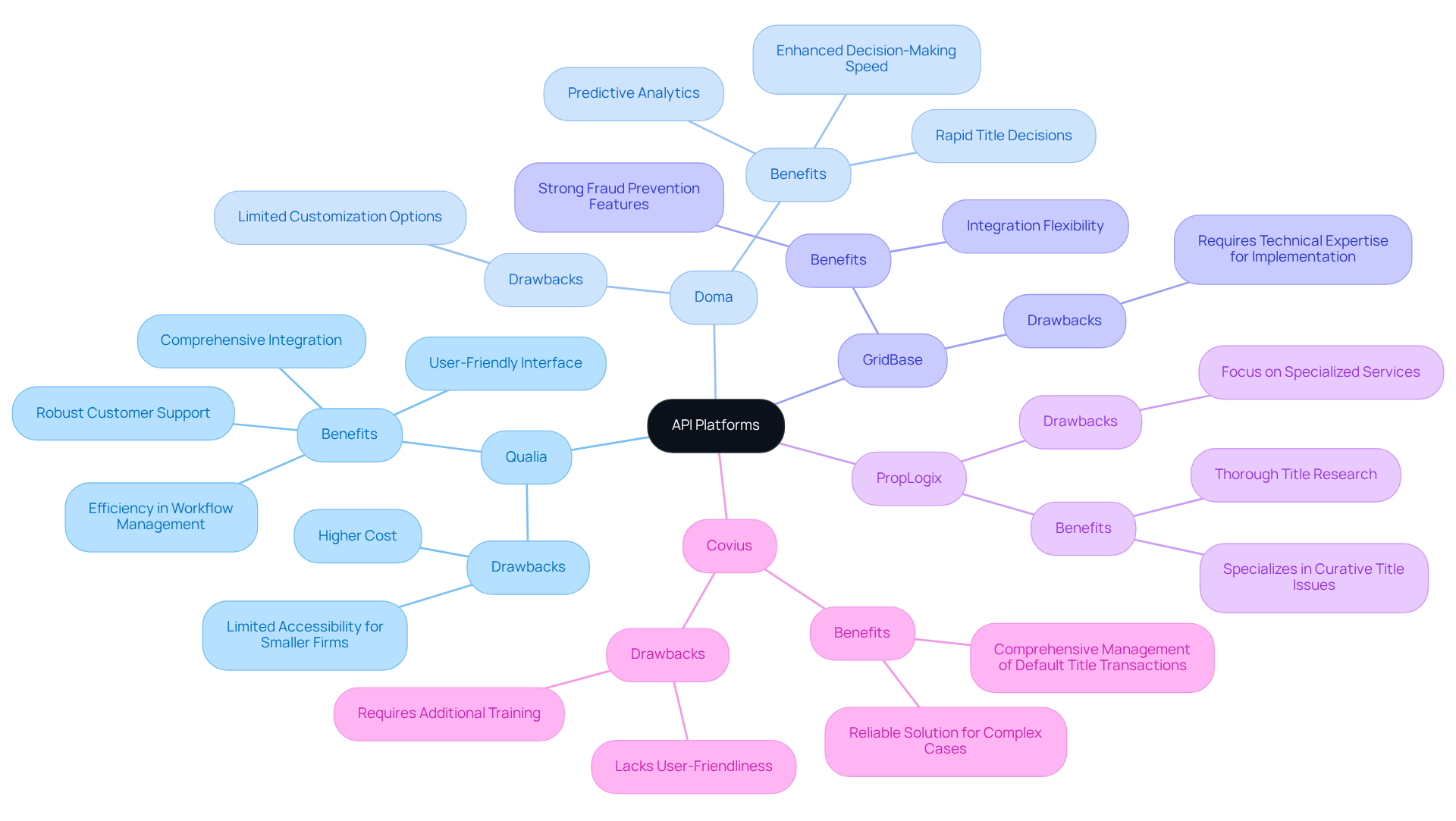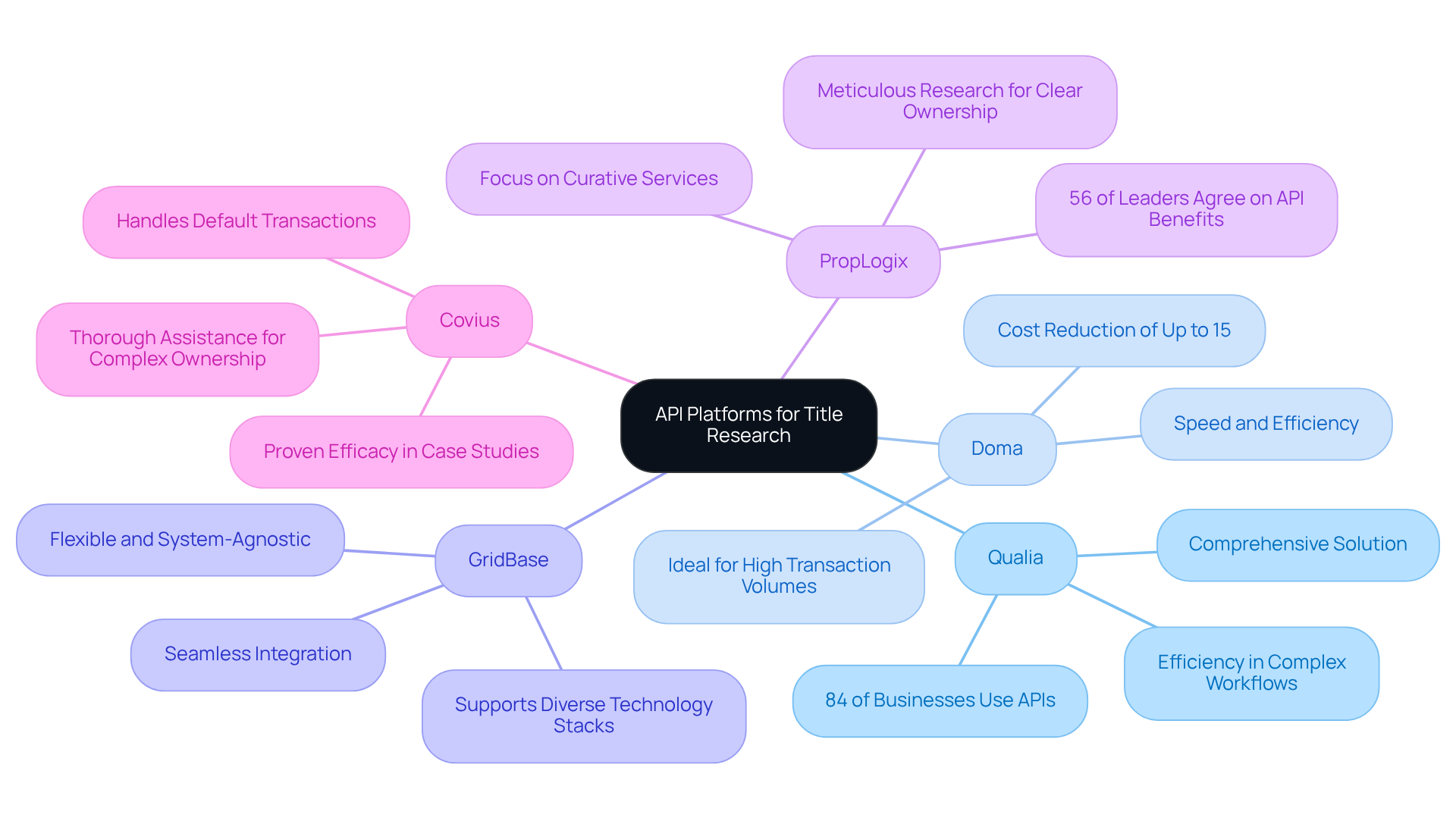Overview
API platforms for curative title tracking serve as essential tools that significantly enhance the efficiency and accuracy of ownership research processes in real estate. The importance of precise title research cannot be overstated, as it lays the foundation for informed decision-making in property transactions.
However, professionals often face challenges in managing vast amounts of data and ensuring compliance with legal requirements. Platforms like Parse AI address these challenges by leveraging advanced technologies such as machine learning and optical character recognition to automate tasks.
Consequently, this automation leads to substantial cost savings and improved workflows for property professionals, making these platforms invaluable in the current market landscape.
Introduction
API platforms for curative title tracking are revolutionizing the realm of real estate ownership research. They offer unprecedented efficiency and accuracy through advanced technologies such as machine learning and optical character recognition. These innovative systems automate complex processes and promise significant cost savings, making them indispensable for property professionals. However, with a plethora of options available, determining which platform best meets specific needs amidst the rapid evolution of the industry poses a challenge.
Overview of API Platforms for Curative Title Tracking
API platforms for curative title tracking significantly enhance the efficiency and precision of ownership research processes. By leveraging advanced technologies such as machine learning and optical character recognition, these systems automate and streamline the tracking of order requests and curative tasks. Parse AI distinguishes itself in this domain by providing a platform that enables title researchers to complete abstracts and reports with greater speed and accuracy, resulting in substantial cost savings compared to traditional methods.
With over 50 years of combined industry expertise, Parse AI was founded by specialists from the energy, property, and technology sectors who understand the complexities of verifying property ownership. This deep knowledge informs the development of solutions that address the most pressing challenges faced by property professionals today. Notably, Parse AI collaborates closely with property and land specialists to continuously refine its offerings based on their feedback and requirements.
The market for API platforms for curative title tracking in is expanding rapidly, largely due to the growing demand for automation and efficiency. Recent reports indicate that the global API management market has experienced substantial growth, reflecting a strong trend toward digital transformation within the industry.
Case studies illustrate the tangible benefits of these systems. For instance, Parse AI has revolutionized property research by enabling researchers to enhance their workflows considerably. Unique features of the Parse AI platform, including its intuitive interface and customizable reporting tools, further set it apart from competitors. This aligns with the broader trend of digitalization in the industry, where firms are increasingly adopting technology to meet rising client expectations.
In conclusion, understanding the capabilities of Parse AI is essential for property professionals aiming to improve their research workflows and maintain competitiveness in a rapidly evolving market.
Key Features of Leading API Platforms
- Qualia: This platform features a read-write API that empowers users to place order requests, track progress, and manage documents with ease. Its seamless integration with various property processes significantly enhances workflow efficiency, making it a preferred choice for numerous professionals.
- Doma: Recognized for its rapid title decision-making, Doma's API harnesses machine learning to provide instant title insights. This capability drastically reduces turnaround times, enabling real estate professionals to make informed decisions swiftly.
- GridBase: As a system-agnostic solution, GridBase integrates seamlessly with any existing technology stack. It offers real-time status monitoring and robust fraud prevention tools, rendering it a versatile option for lenders and document agents in search of comprehensive solutions.
- PropLogix: This platform excels in delivering extensive curative services for ownership, including municipal lien searches and tax certificate tracking. These features are critical for ensuring clear titles, thereby enhancing the reliability of property transactions.
- Covius: Specializing in default document transactions, Covius serves as a dependable resource for addressing complex ownership issues related to loan modifications and short sales. Its concentrated focus in these areas equips professionals to navigate challenging scenarios effectively.
Collectively, these API platforms for enhance the efficiency of document tracking and remedial processes, effectively addressing the diverse needs of property professionals.
Benefits and Drawbacks of Each API Platform
-
Qualia:
- Benefits: Qualia stands out for its comprehensive integration with closing processes, user-friendly interface, and robust customer support, making it a favored option among real estate professionals. Furthermore, with the expanding $29 trillion opportunity in HELOC growth, Qualia's efficiency in managing workflow processes becomes increasingly valuable.
- Drawbacks: However, its higher cost compared to some competitors can serve as a barrier for smaller firms, thereby limiting accessibility.
-
Doma:
- Benefits: Renowned for its rapid title decisions and predictive analytics, significantly enhances decision-making speed, a crucial factor in today's competitive market. Recent developments underscore Doma's efficiency in ownership decision-making, further solidifying its position as an industry leader.
- Drawbacks: Yet, the platform's limited customization options may not cater to the specific needs of all users, potentially hindering its effectiveness for certain firms. Doma's employee count of 1001-5000 and support for JDK 8 and later versions bolster its credibility.
-
GridBase:
- Benefits: GridBase offers the flexibility to integrate with various systems and boasts strong fraud prevention features, appealing to firms that prioritize security.
- Drawbacks: Conversely, implementation may necessitate more technical expertise, posing challenges for teams lacking dedicated IT support.
-
PropLogix:
- Benefits: PropLogix specializes in curative title issues, ensuring thorough title research that effectively addresses specific challenges within the field.
- Drawbacks: Nevertheless, its focus on specialized services may not encompass all research needs, potentially restricting its usefulness for firms seeking a more comprehensive solution.
-
Covius:
- Benefits: Covius provides comprehensive management of default title transactions, offering a reliable solution for complex cases that demand detailed oversight.
- Drawbacks: On the downside, the system may lack user-friendliness compared to others, necessitating additional training for effective use, which can delay onboarding processes.
Incorporating insights from real estate professionals regarding the cost versus benefits of Qualia and Doma could further enrich this discussion, providing valuable perspectives for the target audience. Kennedy Edgerton's quote about empowering readers through informed choices could also enhance the authoritative tone of this section.

Suitability of API Platforms for Various Title Research Needs
- Qualia: This system excels as a comprehensive solution, seamlessly merging document tracking with closing procedures. It is particularly well-suited for larger firms that navigate complex workflows, ensuring efficiency and accuracy throughout the transaction lifecycle. As industry experts note, API platforms for curative title tracking, including Qualia, are essential for enhancing operational productivity, with 84% of businesses leveraging these API platforms to improve their services.
- Doma: Doma distinguishes itself for organizations that prioritize speed and efficiency in ownership decision-making. It is ideal for firms managing high volumes of transactions, facilitating rapid responses and streamlined processes, thereby significantly enhancing operational productivity. Recent statistics indicate that businesses utilizing APIs can reduce costs by up to 15%, making Doma a valuable asset for transaction-heavy firms.
- GridBase: This solution is designed for lenders and document agents seeking a flexible, system-agnostic platform that can easily adapt to existing workflows. It is particularly beneficial for firms with diverse technology stacks, allowing for seamless integration and enhanced functionality. The adaptability of GridBase aligns with the growing trend of API platforms for curative title tracking, which is revolutionizing how development teams operate.
- PropLogix: Recommended for property and real estate law firms, PropLogix focuses on curative services. It is best suited for companies dedicated to ensuring clear ownership through meticulous research, providing the necessary tools to effectively address ownership issues. The importance of such specialized services is underscored by the fact that 56% of enterprise leaders agree that help in building better digital experiences and products.
- Covius: This system is perfect for companies managing default transactions and intricate ownership issues. Covius serves as a dependable resource for handling complex ownership matters, establishing itself as a favored option for groups that require thorough assistance in navigating intricate property environments. Case studies indicate that companies using Covius have effectively addressed complex ownership issues, showcasing its efficacy in practical scenarios.
In summary, while each platform offers unique features tailored to specific needs, integrating statistics, expert quotes, and relevant case studies can further enhance the understanding of their effectiveness in title research.

Conclusion
The exploration of API platforms for curative title tracking highlights the transformative impact of technology on the real estate industry. These platforms, particularly Parse AI, not only enhance the efficiency of ownership research but also address the complexities of property verification with remarkable precision. By automating key processes, these systems empower professionals to navigate the intricate landscape of title research more effectively, ultimately leading to improved operational productivity and cost savings.
Throughout the article, key platforms such as Qualia, Doma, GridBase, PropLogix, and Covius have been examined, each offering distinct features tailored to various needs within the industry. From Qualia's comprehensive integration to Doma's rapid decision-making capabilities, these platforms cater to a wide range of requirements—from large firms managing complex workflows to specialized services for property law practitioners. The insights provided reflect a growing trend toward digitalization, emphasizing the importance of selecting the right API platform to maintain competitiveness in a rapidly evolving market.
As the demand for automation and efficiency continues to rise, property professionals are encouraged to assess their specific needs and consider the advantages of adopting these innovative solutions. By leveraging the capabilities of leading API platforms for curative title tracking, firms can enhance their research workflows, meet client expectations, and ultimately drive success in an increasingly digital landscape.
Frequently Asked Questions
What is the purpose of API platforms for curative title tracking?
API platforms for curative title tracking enhance the efficiency and precision of ownership research processes by automating and streamlining the tracking of order requests and curative tasks.
How does Parse AI improve the title research process?
Parse AI enables title researchers to complete abstracts and reports with greater speed and accuracy, resulting in substantial cost savings compared to traditional methods.
Who founded Parse AI and what is their background?
Parse AI was founded by specialists from the energy, property, and technology sectors, bringing over 50 years of combined industry expertise to address the complexities of verifying property ownership.
What is the current trend in the market for API platforms in real estate research?
The market for API platforms for curative title tracking is expanding rapidly due to the growing demand for automation and efficiency, reflecting a strong trend toward digital transformation within the industry.
What are some unique features of the Parse AI platform?
Unique features of the Parse AI platform include its intuitive interface and customizable reporting tools, which enhance workflows for property researchers.
How does Parse AI collaborate with property professionals?
Parse AI collaborates closely with property and land specialists to continuously refine its offerings based on their feedback and requirements.
Why is understanding Parse AI's capabilities important for property professionals?
Understanding the capabilities of Parse AI is essential for property professionals aiming to improve their research workflows and maintain competitiveness in a rapidly evolving market.




